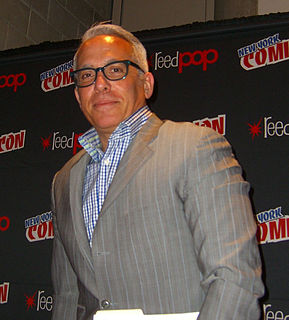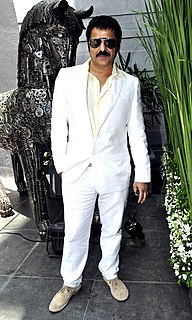A Quote by Stephen Fry
A film star is a kind of public monument, and everyone's staring at them, and they've kind of got railings around them, and they're rather miserable most of the time.
Related Quotes
The kind of loving women and men have in them and the ways it comes out from them makes for them the bottom nature in them, gives to them their kind of thinking, makes the character they have all their living in them, makes them then their kind of women and men and there are always many millions made of each kind of them.
I think everyone agrees First Contact was our best film, and even at that, they're kind of... I don't know, they're sort of movies. But they're kind of really Star Trek movies, if you take my meaning. It's hard for me to say. I was glad to be doing them. Whether they were good isn't really up to me to determine, and it doesn't matter what I think. I thought we had a really nice script on Nemesis, and the audience didn't seem to care for it, so what can you do?
I feel like if you know any women who's an essayist or a writer or a public speaker or just a public person, and they have any presence at all in any kind of social media, or any place where men can voice at them, you have to be pretty amazed at the level of special provocation and sort of violent speech and misogyny that comes at them. Any woman that's really in the public sphere has experienced this. It's kind of shocking how universal it is.
What I feel the most confident about as a teacher, whatever my strengths and weaknesses are. The fact that I got to be around those people, I feel like that I have something to offer because of that blessing. Being around them a little bit... I'm not them. I'm certainly not trying to compare myself to them. But in lieu of them being able to impart something, the fact that I had so many people like that that were kind to me and talked to me was invaluable.
The American public is a very specialized public. The reason it is taken as a realistic film is because inside the fable, I've put that kind of reality in. And it could easily be called, instead of Once Upon a Time in America, Once Upon a Time There Was a Certain Kind of Cinema. Because it was also an homage to cinema.
I've had a real lucky time working in Hollywood. I've talked to other screenwriters, and they're all kind of beaten down and their spirits are crushed, because they work on these screenplays and these projects, and then directors either take them and change everything, rewrite them and make them worse, or they film them and they're nothing like how they imagined it to be.
Unfortunately, when you're working in film, it's this huge machine, and you've got to get everyone right there, so you get kind of locked into things. I'm not sure where the artistry in film making is. It's usually that moment when you're on set and you're working with the actors. That's the time to play around, the moment of theater. And then you can shape things. But a lot of it is just managing stuff. It's upsetting because you get away from the core.


































